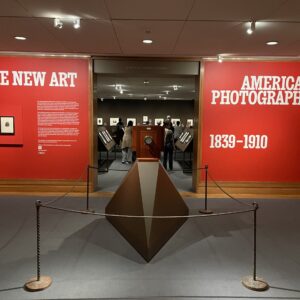JTF (just the facts): A total of 12 large scale color photographs, framed in black and not matted, and hung in the entry area and the main gallery space in the back. All of the works are chromogenic color prints, taken in 2010. The images are shown in three different sizes (with a fourth smaller size not on display): 39×52 (in editions of 9), 48×64 (in editions of 6), and 60×80 (in editions of 3). There are 2 images in the 39×52 size, 6 images in the 48×64 size, and 4 images in the 60×80 size on view. A concurrent show of Burtynsky’s earlier work is on view at Howard Greenberg Gallery (here). (Installation shots at right.)
Comments/Context: Edward Burtynsky’s photographs have routinely posed nuanced questions about how certain human actions have potentially far reaching and often unseen implications for the planet. At massive industrial sites criss-crossing the globe, he has documented both the rigid order and the decaying chaos of open pit mines, Chinese factories, ship salvage yards, and stone quarries, finding abstract beauty amid the expansive work environments. In his previous project on the end-to-end influence of oil, he took a broader look at the upstream causes and downstream effects of the entire industry, connecting the dots to consequences that weren’t immediately obvious. His most recent pictures are part of a new project on water, presumably investigating how the increasing scarcity of yet another vital resource is changing the way we live.
All of the photographs in this show were taken in the dusty hills of northern Spain, where water has been in short supply for generations. Looking down from a helicopter, Burtynsky has captured the endless stripes and striations carved into the dirty foothills, flattening out the landscape into an abstract puzzle of fingered, terraced fields. The visual patterns are a shocking echo of the dense paintings of Jean Dubuffet (an example, here), where the land has become a patchwork of squiggly quilted parcels, cross hatched by irrigation, mowing and thin, intervening roads. The undulating topography has been condensed into subtle geometries and graphic forms, the hand of man writ large on the rocky terrain.
There is virtually no green in the palette of these images (save a few olive trees as dots); instead, the land is painted in beige and rust, grey and black, with a dusting of drifted white snow. These subdued colors highlight the desolation and desperation in farming this country, accenting the sense of scratching an existence out of land that is indifferent and uncooperative. The pictures ask tough questions about how our agricultural needs will evolve as water sources become more and more depleted, and to what lengths we will be required to remake the land to adapt to this new reality. While there is an uncanny, frenetic elegance to these muted landscapes, their message is surprisingly dark and ominous.
In general, I think these images have moved Burtynsky back towards a more painterly kind of photography, where landscapes are transformed into expressive gestures. At the same time, I think his vision of how photography can influence the direction of the collective conversation is getting broader; with each successive project, he is taking on larger and more complicated issues. The worldwide water situation will only become more tense and strategic in the coming years, so Burtynsky’s artistic exploration of this subject may well be an important starting point for raising the awareness of what we’re up against.
Collector’s POV: The prices for the works in this show are as follows: the 39×52 prints are $16500, the 48×64 prints are $24000, and the 60×80 prints are $42000 (I didn’t get the price for the smallest size not on view). Burtynsky’s photographs have slowly become more available in the secondary markets over the past few years, with prices at auction ranging between roughly $5000 and $48000.









Fantastic show. His prices are a little high imo. I really look forward to your Sharon Core | Esko Mannikko review.
Have you ever considered throwing a non-photography review into the mix on your DLK Collection?
Yours,
Katie